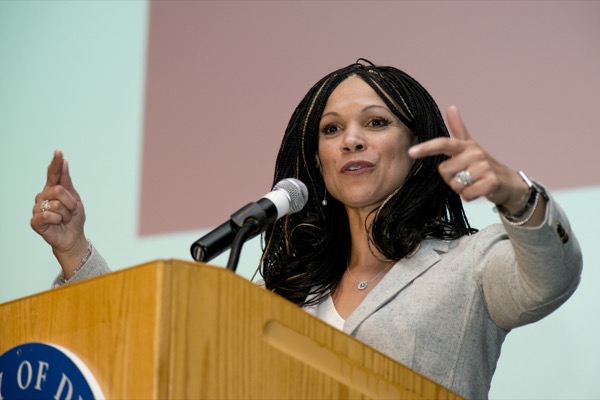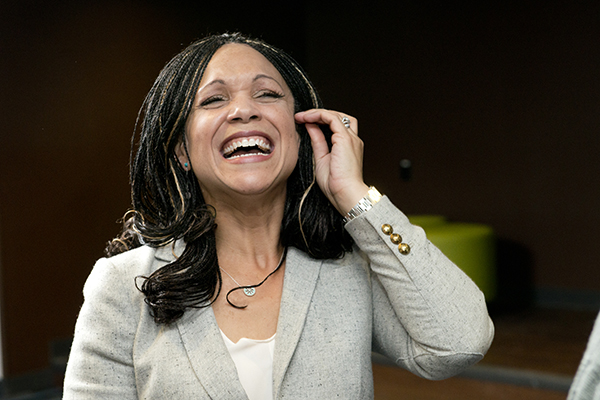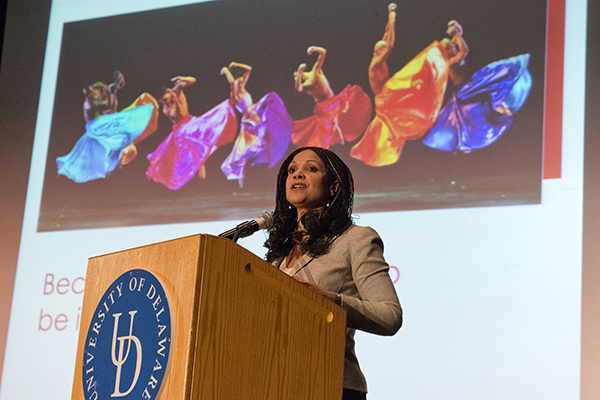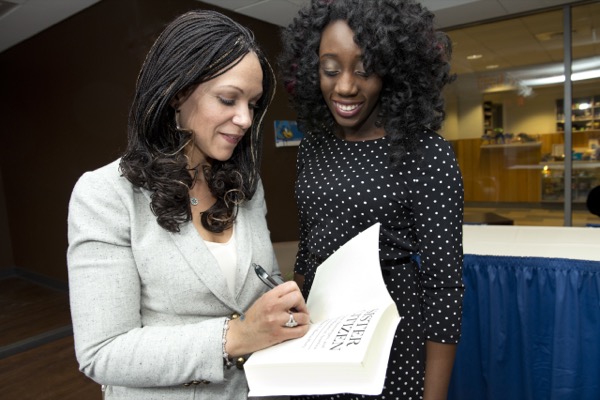Create necessary change
Harris-Perry urges creative response in continuing tradition of civil rights activism
1:46 p.m., Feb. 20, 2015--Although temperatures outside were plunging to the single digit mark, members of the University of Delaware and surrounding communities gave guest speaker Melissa Harris-Perry a warm and enthusiastic welcome as she delivered the keynote talk at the Black History Month Extravaganza event held Thursday evening, Feb. 19, in the Trabant University Center.
During her talk, “Voice and Activism: Inheriting the Struggle,” the host of the Melissa Harris-Perry Show on MSNBC and professor at her alma mater, Wake Forest University, noted that one of the aspects of living in a democracy is having the right to govern and not just be governed.
People Stories
'Resilience Engineering'
Reviresco June run
“As adults, you have the right to rule and not just to be ruled, the right to be heard and not silenced,” Harris-Perry said. “You have the right to govern, to speak, to be heard, and you have that right, even when you have just lost an election.”
Harris-Perry also reminded the audience that for African Americans, attaining the rights laid forth in the Declaration of Independence has always involved a struggle -- one that continues to the present day.
“We had this incredible aspirational moment, but I want to acknowledge that in this nation, securing these actual rights, inalienable and self-evident as they are, has always required struggle, and for some of us the struggle is not abstract, but always in bodies,” Harris-Perry said. “Bodies that have been moved, and bodies that will not be moved, and bodies that sit. These bodies march, and these bodies are broken.”
Among the bodies were those of assassinated President John F. Kennedy and murdered civil rights leader Rev. Dr. Martin Luther King Jr., whose broken bodies led to the legislation, including the passage of the Fair Housing Act, signed by President Lyndon B. Johnson in 1968.
“We have always had images of broken bodies,” Harris-Perry said. “The idea of freedom gets worked out on bodies.”
Harris-Perry presented visual reminders of just how the bodies of African Americans have been broken through the use of photographs, one showing the lynching of two black men and including a group of white people who appeared to evidence no guilt or shame in the acts of murder they had just committed as they posed for the camera.
Also shown was the famous image of Elizabeth Eckford as she arrived at Little Rock High School on Sept. 4, 1957, surrounded by a hostile crowd who did not want African American children enrolled in the city’s public school system.
“Elizabeth Eckford made that dress herself,” Harris-Perry said. “She pressed it herself.”
While the images reveal the reality of the bodies that were broken to achieve the ideals expressed in the Declaration of Independence, Harris-Perry noted that the struggle depicted in sepia-colored black and white photographs is not just some historical past, but one that continues today.
“We had Trayvon Martin, the unarmed black teenager who was killed in 2012, and Michael Brown, who was shot and killed in 2014 in Ferguson,” Harris-Perry said. “We left his body on the ground for hours in the heat, so the community could see it and be terrorized, and when we protested at them for having killed Michael, they shot tear gas at our children.”
Harris-Perry noted that while King is seen by many as the collective voice of the civil rights movement of the 1950s and 1960s, the question he posed in his 1967 book, Where Do We Go from Here: Chaos or Community?, calls for creative answers that go beyond the laying down of bodies to be broken.
“Those bodies that refused to be moved respected no arbitrary boundaries. They were artists,” Harris-Perry said. “I think we have to be creative. I want all of you to start thinking about how to be an artist.”
Special presentation
The evening’s Black History Month Extravaganza program began with a welcome from master of ceremonies Mark White, a sophomore environmental major.
The Darks Arts Performing Dance Company gave a moving performance and Gerti Wilson, a junior political science major, introduced the guest speaker.
Kasandra Moye, director of the Center for Black Culture, described why the theme selected for Black History Month 2015 is “Black Voices Matter.”
Moye also noted that 2015 marks the 50th anniversaries of Bloody Sunday in Selma, Alabama, the Voting Rights Act of 1965 and the assassination of Malcolm X.
“There are many things that we can do to create necessary change, but today I’m offering something simple for everyone in this room to consider — speak your truth,” Moye said. “If someone asks you a question, respectfully tell them your truth, please. Things can’t get better if we aren’t willing to offer the truth about our experiences and needs.”
History shows that it only takes a single great idea or one person to generate significant change, Moye said.
“It is not enough to simply say that we value diversity. We must act and do what’s necessary for blacks and other marginalized groups to achieve the same levels of success,” Moye said. “The health and wellbeing of the black community, the University of Delaware and the world depends on this.”
Moye also recognized the support received for the Center for Black Culture from its ongoing partnerships with students, student groups and cosponsors, including the Cultural Programming Advisory Board, Black Student Union, Delta Sigma Theta and Parents Fund, which provide Student Life with valuable financial resources to support the education mission of the University through innovative services and programs that support student learning, encourage personal development and wellbeing, facilitate strong bonds among students, and enhance their identity with the University as a community.
Cosponsors also included the Office of Wellness and Health Promotion, Residence Life and Housing, the Office of Equity and Inclusion, the departments of Black American Studies and Political Science and International Relations, and the Mu Pi Chapter of Delta Sigma Theta sorority.
Following a question and answer session, Harris-Perry was presented with several gifts and received a standing ovation.
Article by Jerry Rhodes
Photos by Lane McLaughlin














